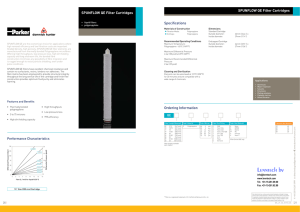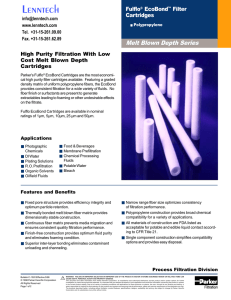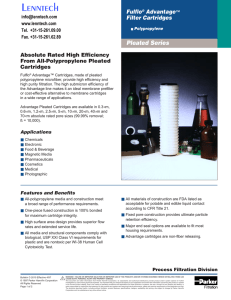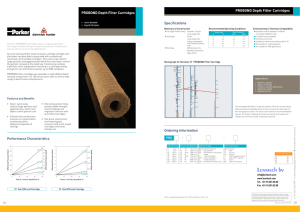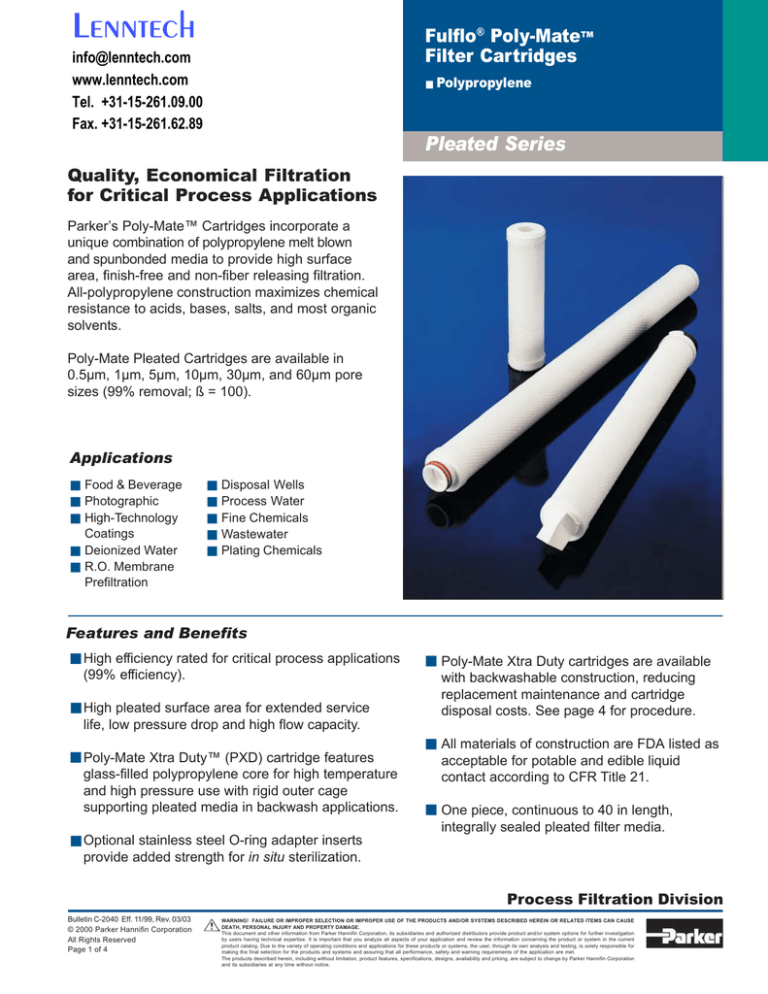
Lenntech
Fulflo® Poly-Mate™
Filter Cartridges
info@lenntech.com
www.lenntech.com
Tel. +31-15-261.09.00
Fax. +31-15-261.62.89
■
Polypropylene
Pleated Series
Quality, Economical Filtration
for Critical Process Applications
Parker’s Poly-Mate™ Cartridges incorporate a
unique combination of polypropylene melt blown
and spunbonded media to provide high surface
area, finish-free and non-fiber releasing filtration.
All-polypropylene construction maximizes chemical
resistance to acids, bases, salts, and most organic
solvents.
Poly-Mate Pleated Cartridges are available in
0.5µm, 1µm, 5µm, 10µm, 30µm, and 60µm pore
sizes (99% removal; ß = 100).
Applications
■ Food & Beverage
■ Photographic
■ High-Technology
Coatings
■ Deionized Water
■ R.O. Membrane
Prefiltration
■
■
■
■
■
Disposal Wells
Process Water
Fine Chemicals
Wastewater
Plating Chemicals
Features and Benefits
■ High efficiency rated for critical process applications
(99% efficiency).
■ High pleated surface area for extended service
life, low pressure drop and high flow capacity.
■ Poly-Mate Xtra Duty™ (PXD) cartridge features
glass-filled polypropylene core for high temperature
and high pressure use with rigid outer cage
supporting pleated media in backwash applications.
■ Optional stainless steel O-ring adapter inserts
provide added strength for in situ sterilization.
■ Poly-Mate Xtra Duty cartridges are available
with backwashable construction, reducing
replacement maintenance and cartridge
disposal costs. See page 4 for procedure.
■ All materials of construction are FDA listed as
acceptable for potable and edible liquid
contact according to CFR Title 21.
■ One piece, continuous to 40 in length,
integrally sealed pleated filter media.
Process Filtration Division
Bulletin C-2040 Eff. 11/99, Rev. 03/03
© 2000 Parker Hannifin Corporation
All Rights Reserved
Page 1 of 4
WARNING! FAILURE OR IMPROPER SELECTION OR IMPROPER USE OF THE PRODUCTS AND/OR SYSTEMS DESCRIBED HEREIN OR RELATED ITEMS CAN CAUSE
DEATH, PERSONAL INJURY AND PROPERTY DAMAGE.
This document and other information from Parker Hannifin Corporation, its subsidiaries and authorized distributors provide product and/or system options for further investigation
by users having technical expertise. It is important that you analyze all aspects of your application and review the information concerning the product or system in the current
product catalog. Due to the variety of operating conditions and applications for these products or systems, the user, through its own analysis and testing, is solely responsible for
making the final selection for the products and systems and assuring that all performance, safety and warning requirements of the application are met.
The products described herein, including without limitation, product features, specifications, designs, availability and pricing, are subject to change by Parker Hannifin Corporation
and its subsidiaries at any time without notice.
Pleated Series
The Filters of Choice for . . .
Foods and Beverages
High Technology Coatings
Photographic
Foods and beverages must be
filtered with products made from
components complying with FDA
regulations for food contact use.
Extraction of binders, chemical
additives and media fragments
into foods and beverages is
unacceptable. Poly-Mate™
cartridges are thermally bonded
and meet all FDA required
standards. In many applications,
PolyMate™ cartridges are a
more cost-effective alternative
to melt blown and spunbonded
depth cartridges.
High tech coatings used on magnetic
tape, floppy discs, lenses and optical
fibers require filtration with products
that capture agglomerates and large
contaminants with high efficiency
while allowing the smaller coating
particles to pass. The desired cutoff
particle size should not change
during filtration of the batch. This
requires the high surface area
and fixed pore media found in
Poly-Mate cartridges.
Photographic gelatins, emusions,
rinses and chemcals benefit from
filtration with Poly-Mate catridges.
They are non-photosensitive, do
not leach harmful contaminants
and provide long service life at
low initial pressure drop.
R.O. Filtration
Prefiltration requirements for
reverse osmosis membranes are
similar to those for foods and
beverages, although FDA
acceptability is often not required.
The finish-free, thermally bonded
media and large surface area of
Poly-Mate cartridges make them
the perfect choice for this liquid
process application.
Specifications
Filtration Ratings:
■ 99% at 0.5µm, 1µm, 5µm, 10µm,
30µm, and 60µm pore sizes
Effective Filtration Area:
■ Up to 6.0 ft2/10 in (0.6m2/254mm)
Materials of Construction:
■ Filter Media and Support Layers:
polypropylene
■ Bonding Polymer: none, completely
fusion-sealed
■ Surface Treatment: none (fusionsealed), chemically inert and neutral
■ Media Protection:
PM - polypropylene netting
PXD - polypropylene cage
■ Support Core:
PM - polypropylene
PXD - glass-filled polypropylene
■ Pleat Pack Side Seal:
fused polypropylene
* A trademark of E. I. duPont de Nemours & Co.
Bulletin C-2040
Page 2 of 4
■ End Caps: polypropylene
■ Seals: Buna-N, EPR, silicone,
Viton,* PFA encapsulated Viton*
O-rings, polyethylene foam gaskets
Recommended Operating Conditions:
■ Poly-Mate Cartridges:
Change Out ∆P: 35 psid (2.4 bar)
Maximum Temperature: 200°F (93°C)
Maximum Temperature @ 35 psid
(2.4 bar): 125°F (52°C)
Maximum ∆P @ 70°F (21°C):
60 psid (4.1 bar)
Maximum ∆P @ 200°F (93°C):
10 psid (0.7 bar)
■ Poly-Mate Xtra-Duty™ Cartridges:
Change Out ∆P: 35 psid (2.4 bar)
Maximum Temperature: 200°F (93°C)
Maximum Temperature @ 35 psid
(2.4 bar): 200°F (93°C)
Maximum ∆P @ 70°F (21°C):
90 psid (6.1 bar)
Maximum ∆P @ 200°F (93°C):
35 psid (2.4 bar)
Dimensions:
■ Overall Length: See bulletin A-700.
SOE fits standard vessels with
O-ring receptacles.
■ Cartridge Outside Diameter:
2-1/2 in (63.5 mm)
■ Cartridge Inside Diameter:
DOE - 1-1/16 in (27 mm);
SOE - 1 in (25.4 mm)
Recommended Maximum Flow Rate:
■ Maximum 10 gpm per 10 in length
Designed Flow Rate (in water):
■ 2.5 gpm per 10 in length
(9.5 lpm per 254 mm)
Performance Profile
Parker’s Process Filtration
Division test procedures
address the varying filtration
requirements of customers.
Selection of media of the PolyMate™ product line maximizes
performance in terms of effciency,
dirt-holding capacity, flow and
other characterization variables.
Tests and analyses were
conducted using microprocessor
technology for accuracy.
High Filtration Efficiency
Higher Throughput
Filtration efficiency is affected by
media pore size and fluid velocity.
The removal efficiency below is
based on a design flow rate of 2.5
gpm per 10 in (9.5 lpm per 254 mm
cartridge). Lower flow rates yield
higher efficiencies. Higher flow rates
result in lower efficiencies.
Higher flow rates result in the use
of fewer cartridges and smaller
housings to achieve system flow
rate requirements. In addition, lower
∆P will reduce power requirements
and pump wear and tear.
Liquid Particle Retention Ratings (µm) @ Removal Efficiencies of:
Cartridge
β = 5000
Absolute
PM / PXD005
PM / PXD010
PM / PXD050
PM / PXD100
PM / PXD300
PM / PXD600
3
5
15
30
45
95
β = 1000
99.9%
3
4.5
10
28
43
90
β = 100
99%
0.5
1.0
4
10
30
50
β = 50
98%
.25
0.5
2.0
6
18
40
■ Poly-Mate / PXD Particle Removal
Efficiency Over Life
β = 20
95%
β = 10
90%
<0.1
0.2
0.7
3
8
20
<0.1
<0.1
0.25
1.2
4.5
12
The initial clean water (1 centistoke)
∆P through a 10 in (254 mm)
cartridge is very low. The flow rate
restriction from the filter vessel
is the determining factor when
considering the system ∆P. The
high dirt-holding capacity of
Poly-Mate cartridges provides
longer service life and reduces the
frequency of filter change out and
associated costs. The Poly-Mate
Xtra-Duty™ cartridge is designed
specifically for backwash
applications and can reduce
cartridge disposal and labor costs.
■ Poly-Mate Length
Factors
■ Poly-Mate / PXD Flow Factors
(psid/gpm @ 1 cks)
Length
(in)
Length
Factor
Rating
(µm)
9
10
19
20
29
30
40
1.0
1.0
2.0
2.0
3.0
3.0
4.0
0.5
1.0
5.0
10.0
30.0
60.0
Flow
Factor
0.0900
0.0530
0.0290
0.0068
0.0048
0.0030
Flow Rate and Pressure Drop Formulae:
Flow Rate (gpm) = Clean ∆P x Length Factor
Viscosity x Flow Factor
Clean ∆P = Flow Rate x Viscosity x Flow Factor
Length Factor
Beta Ratio (ß) = Upstream Particle Count @ Specified Particle Size and Larger
Downstream Particle Count @ Specified Particle Size and Larger
Percent Removal Efficiency =
( ß-1
) x 100
ß
Notes:
1. Clean ∆P is PSI differential at start.
2. Viscosity is centistokes. Use Conversion
Tables for other units.
3. Flow Factor is ∆P/GPM at 1 cks for 10 in
(or single).
4. Length Factors convert flow or ∆P from 10 in
(single length) to required cartridge length.
Performance determined per ASTM F-795-88. Single-Pass Test using AC test dust
in water at a flow rate of 2.5 gpm per 10 in (9.5 lpm per 254 mm).
Bulletin C-2040
Page 3 of 4
Pleated Series
Backwash
In
Backwash
Out
3
1
Process In
4
Process out
Backwash Protocol
2
Since applications vary, rigid rules for
backwash operation are impossible.
Please use these guidelines:
Backwash Schematic
■ Initiate a backwash cycle when the
pressure drop rises about 3-4 psid
(0.2 to 0.3 bar) above the initial value
(1-5 psid [0.1 to 0.4 bar] for most
systems) or alternately on a timed
cycle, e.g., daily.
■ Stop the process flow by closing
valves 1 and 2.
■ Begin backwash flow by opening
valves 3 and 4.
■ Backwash pressure should be
about 10 psi (0.7 bar) greater than
the existing pressure drop.
■ A momentary pressure surge is
beneficial in breaking particles free.
■ Backwash flow rate is critical. It
should be 1 to 1-1/2 times the
process flow rate. Allow sufficient time
to flush the contaminant from the
vessel.
10
Cartridge Code (µm)
PM = Standard
PXD = Xtra Duty
PM005 – 0.5
PM010 – 1.0
PM050 – 5.0
PM100 – 10.0
PM300 – 30.0
PM600 – 60.0
Nominal Length
(code)
9
10
19
20
29
30
40
A
N
Core
Seal Material
A = Natural
Polypropylene
(PM core only)
F = Glass-Filled
Polypropylene
(PXD core only)
G = 304 Stainless Steel
(Core only)
N = Natural
Polypropylene (All
support components)
X = Coreless Cartridge
■ Note: Valves 3 and 4 could be attached
to the vessel’s dirty and clean drains,
respectively.
Ordering Information
PM050
■ Close valves 3 and 4 and open
valves 1 and 2 to resume normal
filtration. Vent the vessel. Note
the decrease in pressure drop.
■ Continue backwash cycles until the
pressure drop no longer decreases.
Change cartridges at about 35 psid (2.4
bar).
A = Polyethylene Foam
(DOE Gasket only)
E = EPR
N = Buna-N
S = Silicone
T = PFA Encapsulated
Viton* (222,226
O-Ring only)
V = Viton*
X = No Seal Material
(in)
(mm)
9-5/8
244
9-13/16 249
19-5/8
498
19-15/16 506
29-1/4
743
30-1/16
764
40
1016
** Available only in 9-5/8” (-9) and 19-5/8” (-19) lengths.
* A trademark of E. I. duPont de Nemours & Co.
For pleated cartridge configurations and dimensions, see Bulletin A-700 in the Appendix.
TC
R
End Cap Configurations
Special Options
AR = 020 O-Ring/Recessed
B = Bubble Point Test
(Gelman)
R = Rinse with DI
D O = Double Open End (DOE)
water (5 minutes)
D X = DOE With Core Extender Z6 = Individual Poly bag
L L = 120/120 (Filterite LMO)**
only (PXD Only)
L R = 120 O-Ring/Recessed**
(Nuclepore)
O B = Std. Open End/Polypro
Spring Closed End
P R = 213 O-Ring/Recessed
(Ametek and Parker LT
Polymeric Vessels)**
S C = 226 O-Ring/Cap
S F = 226 O-Ring/Fin
SSC = S.S. Inserted 226
O Ring/Closed
S S F = S.S. Inserted 226 O ring/Fin
S T C = S.S.Inserted 222
O Ring/Closed
S T F = S.S. Inserted 226 O ring/Fin
T C = 222 O-Ring/Cap
T F = 222 O-Ring/Fin
T X = 222 O Ring/Flex Fin
X B = Ext. Core Open End/
Polypro Spring Closed End
Process Filtration Division
Lenntech
info@lenntech.com
www.lenntech.com
Tel. +31-15-261.09.00
Fax. +31-15-261.62.89

